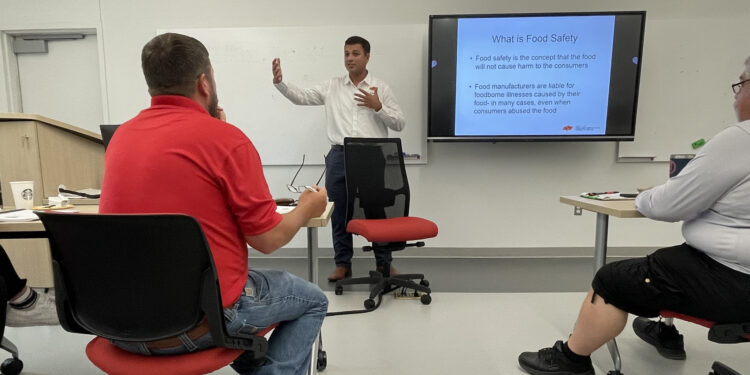OKMULGEE – The College of Muscogee Nation Extension Office hosted a Food Freedom Act Workshop on July 18. The event was hosted in collaboration with Oklahoma State University and served as a training session for registrants seeking to learn about specific homemade foods that are legal to sell under House Bill 1032, the Oklahoma Homemade Food Freedom Act. Registrants also learned about food safety protocols, responsible home manufacturing techniques, and small business financial planning. The all-day workshop featured speakers from OSU and the Oklahoma Department of Agriculture, Food and Forestry.
The Homemade Food Freedom Act was initially signed into law on May 10, 2021. It replaced the Home Bakery Act of 2013 and modified the Honey Sales act. Under the law, Oklahoma residents are permitted to sell food items made in their homes, limited to $75,000 in gross annual sales. These items must be properly labeled and food safety certification classes are required if the homemade item is a temperature-controlled food. Homemade items that can not be sold under the law include alcoholic beverages, unpasteurized milk, marijuana products, meat or meat byproducts, poultry and seafood.
These food items can be sold anywhere in the state in person, by internet or phone, markets or retail. The law does not permit items to be sold across state lines. Additionally, placards with disclosures must be in clear view on display at booths where the products are sold.

Labels must be attached on the food item containers with specific information on the name of the producer, ingredients, allergens, and where the product was produced.
OSU Associate Professor and Extension Specialist for Food Safety Dr. Ravi Jadeja, Ph.D was one of the speakers at the workshop. Jadeja has previously worked with the MCN on food safety training in the past. He has worked with the Osage Nation and the Pawnee Nation on USDA and food safety grants. Jadeja believes House Bill 1032 has empowered homemade food entrepreneurs eager to sell their creations in the market.
“It (the law) used to be very restrictive. Before, if you wanted to sell homemade items you had to find a commercial kitchen. There are not many out there. You would have to work on that commercial kitchen’s schedule in order to get the product out,” Jadeja said. “Until you can prove your concept that your food is really popular, it’s not worth it to spend the time and resources. This (workshop) gives a great opportunity for people to receive supplemental income and to prove the concept that it is viable in the market.”
CMN Extension Program Coordinator Chris Azbell (Mvskoke) was excited to bring the workshop to CMN. According to Azbell, the goal was to get people interested in selling their own food items at local markets like the Looped Square Farmer’s Market. By taking the workshop, registrants have a clear idea of what they can sell, how to safely prepare it, and how to make a profit.
“If you take this class you will learn about it (The Homemade Food Freedom Act),” Azbell said. “When it’s over you learn how to operate in a farmer’s market type of agribusiness world.”

Empowering Small Business
In the post-Covid-19 era with food insecurity rising, Jadeja believes it is important for consumers to have more choices where they buy their foods. According to Jadeja, decentralizing food production will be beneficial for consumers because it means that they do not have to rely exclusively on grocery store chains for food security. Oklahoma has seen its share of food insecurity over the past few years. One in six adults within the state are food insecure, as well as one in four children, according to OSU Extension’s Program.
Additionally, Jadeja believes that growing food at home and purchasing food from small businesses has nutritional and economic benefits. Natural produce like fruits and vegetables can be grown from home and sold under House Bill 1032.
Jadeja asserted that the workshop is important because it pinpoints which food items are legally allowable under House Bill 1032. For example, a popular food item that is not permitted to be sold under the bill are meat pies.
Those who attended the workshop also learned about the severity of contaminated foods that cause foodborne illnesses. This can leave sellers legally liable if they are not careful in how they prepare their products.
“It is very counterproductive (food poisoning), not only is the person who got sick will be impacted but it will send a message to state legislators managing this law that these products are not safe. That’s why we want to make sure that people produce safe food products.” Jadeja said.
According to Azbell, the most important aspects of the workshop are empowering small business owners and making sure the products they sell are safe for consumption.
“I think a lot of people in modern day times have a desire to sell,” Azbell said. “At the end of the day we want people to be compliant with the state laws so that when they come and sell on our property (farmer’s market) they are compliant and follow protocols.”
The next Homemade Food Freedom Act Workshop will be held on Sept. 10 at the OSU Extension Conference Center in Oklahoma City. Another workshop will be held on Oct. 8 at the Food and Agricultural Products Center on the OSU’s main campus in Stillwater. Each workshop has limited spacing and costs $35 to sign up. For registration information, contact fapcregistrations@okstate.edu or 405-744-6277.





